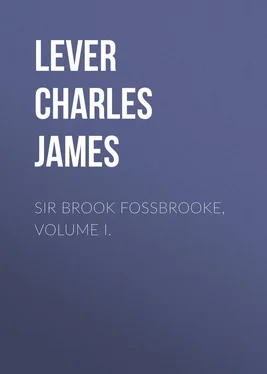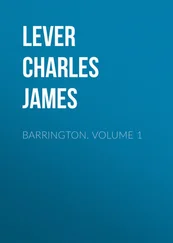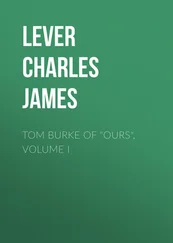Charles Lever - Sir Brook Fossbrooke, Volume I.
Здесь есть возможность читать онлайн «Charles Lever - Sir Brook Fossbrooke, Volume I.» — ознакомительный отрывок электронной книги совершенно бесплатно, а после прочтения отрывка купить полную версию. В некоторых случаях можно слушать аудио, скачать через торрент в формате fb2 и присутствует краткое содержание. Жанр: literature_19, foreign_antique, foreign_prose, на английском языке. Описание произведения, (предисловие) а так же отзывы посетителей доступны на портале библиотеки ЛибКат.
- Название:Sir Brook Fossbrooke, Volume I.
- Автор:
- Жанр:
- Год:неизвестен
- ISBN:нет данных
- Рейтинг книги:3 / 5. Голосов: 1
-
Избранное:Добавить в избранное
- Отзывы:
-
Ваша оценка:
- 60
- 1
- 2
- 3
- 4
- 5
Sir Brook Fossbrooke, Volume I.: краткое содержание, описание и аннотация
Предлагаем к чтению аннотацию, описание, краткое содержание или предисловие (зависит от того, что написал сам автор книги «Sir Brook Fossbrooke, Volume I.»). Если вы не нашли необходимую информацию о книге — напишите в комментариях, мы постараемся отыскать её.
Sir Brook Fossbrooke, Volume I. — читать онлайн ознакомительный отрывок
Ниже представлен текст книги, разбитый по страницам. Система сохранения места последней прочитанной страницы, позволяет с удобством читать онлайн бесплатно книгу «Sir Brook Fossbrooke, Volume I.», без необходимости каждый раз заново искать на чём Вы остановились. Поставьте закладку, и сможете в любой момент перейти на страницу, на которой закончили чтение.
Интервал:
Закладка:
CHAPTER XII. A GREAT MAN’S SCHOOLFELLOW
Whether it was that the Chief Baron had thrown off an attack which had long menaced him, and whose slow approaches had gradually impaired his strength and diminished his mental activity, or whether, as some of his “friends” suggested, that the old man’s tenure of life had been renewed by the impertinences of the newspapers and the insolent attacks of political foes, – an explanation not by any means far-fetched, – whatever the cause, he came out of his illness with all the signs of renewed vigor, and with a degree of mental acuteness that he had not enjoyed for many years before.
“Beattie tells me that this attack has inserted another life in my lease,” said he; “and I am glad of it. It is right that the men who speculated on my death should be reminded of the uncertainty of life by the negative proof. It is well, too, that there should be men long-lived enough to bridge over periods of mediocrity, and connect the triumphs of the past with the coming glories of the future. We are surely not destined to a perpetuity of Pendletons and Fitzgibbons?”
It was thus he discoursed to an old legal comrade, – who, less gifted and less fortunate, still wore his stuff gown, and pleaded for the outer bar, – poor old Billy Haire, the dreariest advocate, and one of the honestest fellows that ever carried his bag into court. While nearly all of his contemporaries had risen to rank and eminence, Billy toiled on through life with small success, liked by his friends, respected by the world, but the terror of attorneys, who only saw in him the type of adverse decisions and unfavorable verdicts.
For forty-odd years had he lived a life that any but himself would have deemed martyrdom, – his law laughed at, his eloquence ridiculed, his manner mimicked, jeered at by the bench, quizzed by the bar, sneered at by the newspapers, every absurd story tagged to his name, every stupid blunder fathered on him, till at last, as it were, by the mere force of years, the world came to recognize the incomparable temper that no provocation had ever been able to irritate, the grand nature that rose above all resentment, and would think better of its fellows than these moods of spiteful wit or impertinent drollery might seem to entitle them to.
The old Judge liked him; he liked his manly simplicity of character, his truthfulness, and his honesty; but perhaps more than all these, did he like his dulness. It was so pleasant to him to pelt this poor heavy man with smart epigrams and pungent sarcasms on all that was doing in the world, and see the hopeless effort he made to follow him.
Billy, too, had another use; he alone, of all the Chief Baron’s friends, could tell him what was the current gossip of the hall, – what men thought, or at least what they said of him. The genuine simplicity of Haire’s nature gave to his revelations a character so devoid of all spitefulness, – it was so evident that, in repeating, he never identified himself with his story that Lendrick would listen to words from him that, coming from another, his resentment would have repelled with indignation.
“And you tell me that the story now is, my whole attack was nothing but temper?” said the old Judge, as the two men walked slowly up and down on the grass lawn before the door.
“Not that exactly; but they say that constitutional irritability had much to say to it.”
“It was, in fact, such a seizure as, with a man like yourself, would have been a mere nothing.”
“Perhaps so.”
“I am sure of it, sir; and what more do they say?”
“All sorts of things, which, of course, they know nothing about. Some have it that you refused the peerage, others that it was not offered.”
“Ha!” said the old man, irritably, while a faint flush tinged his cheek.
“They say, too,” continued Haire, “that when the Viceroy informed you that you were not to be made a peer, you said: ‘Let the Crown look to it, then. The Revenue cases all come to my court; and so long as I sit there, they shall never have a verdict.’”
“You must have invented that yourself, Billy,” said the Judge, with a droll malice in his eye. “Come, confess it is your own. It is so like you.”
“No, on my honor,” said the other, solemnly.
“Not that I would take it ill, Haire, if you had. When a man has a turn for epigram, his friends must extend their indulgence to the humor.”
“I assure you, positively, it is not mine.”
“That is quite enough; let us talk of something else. By the way, I have a letter to show you. I put it in my pocket this morning, to let you see it; but, first of all, I must show you the writer, – here she is.” He drew forth a small miniature case, and, opening it, handed it to the other.
“What a handsome girl! downright beautiful!”
“My granddaughter, sir,” said the old man, proudly.
“I declare, I never saw a lovelier face,” said Haire. “She must be a rare cheat if she be not as good as she is beautiful. What a sweet mouth!”
“The brow is fine; there is a high intelligence about the eyes and the temples.”
“It is the smile, that little lurking smile, that captivates me. What may her age be?”
“Something close on twenty. Now for her letter. Read that.”
While Haire perused the letter, the old Judge sauntered away, looking from time to time at the miniature, and muttering some low inaudible words as he went.
“I don’t think I understand it. I am at a loss to catch what she is drifting at,” said Haire, as he finished the first side of the letter. “What is she so grateful for?”
“You think the case is one which calls for little gratitude, then. What a sarcastic mood you are in this morning, Haire!” said the Judge, with a malicious twinkle of the eye. “Still, there are young ladies in the world who would vouchsafe to bear me company in requital for being placed at the head of such a house as this.”
“I can make nothing of it,” said the other, hopelessly.
“The case is this,” said the Judge, as he drew his arm within the other’s. “Tom Lendrick has beeu offered a post of some value – some value to a man poor as he is – at the Cape. I have told him that his acceptance in no way involves me. I have told those who have offered the place that I stand aloof in the whole negotiation, – that in their advancement of my son they establish no claim upon me , I have even said I will know nothing whatever of the incident.” He paused for some minutes, and then went on: “I have told Tom, however, if his circumstances were such as to dispose him to avail himself of this offer, that – until he assured himself that the place was one to his liking, that it gave a reasonable prospect of permanence, that the climate was salubrious, and the society not distasteful – I would take his daughter to live with me.”
“He has a son, too, has n’t he?”
“He has, sir, and he fain would have induced me to take him instead of the girl; but this I would not listen to. I have not nerves for the loud speech and boisterous vitality of a young fellow of four or five and twenty. His very vigor would be a standing insult to me, and the fellow would know it. When men come to my age, they want a mild atmosphere in morals and manners, as well as in climate. My son’s physiology has not taught him this, doctor though he be.”
“I see, – I see it all now,” said Haire; “and the girl, though sorry to be separated from her father, is gratified by the thought of becoming a tie between him and you.”
“That is not in the record, sir,” said the Judge, sternly. “Keep to your brief.” He took the letter sharply from the other’s hand as he spoke. “My granddaughter has not had much experience of life; but her woman’s tact has told her that her real difficulty – her only one, perhaps – will be with Lady Lendrick. She cannot know that Lady Lendrick’s authority in this house is nothing, – less than nothing. I would never have invited her to come here, had it been otherwise.”
Читать дальшеИнтервал:
Закладка:
Похожие книги на «Sir Brook Fossbrooke, Volume I.»
Представляем Вашему вниманию похожие книги на «Sir Brook Fossbrooke, Volume I.» списком для выбора. Мы отобрали схожую по названию и смыслу литературу в надежде предоставить читателям больше вариантов отыскать новые, интересные, ещё непрочитанные произведения.
Обсуждение, отзывы о книге «Sir Brook Fossbrooke, Volume I.» и просто собственные мнения читателей. Оставьте ваши комментарии, напишите, что Вы думаете о произведении, его смысле или главных героях. Укажите что конкретно понравилось, а что нет, и почему Вы так считаете.












